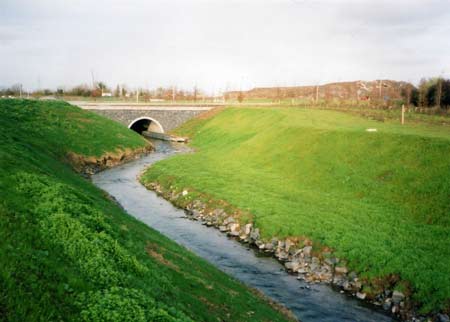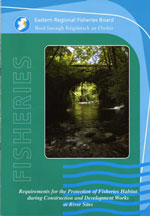Aquatic Environment
Protection of the aquatic environment, which includes both the protection of water quality and the physical habitat, is managed by the Board’s Environmental Officers, all of whom are based at our Dublin office.
This channel has been severly impacted. Much work will be required to restore it to a natural watercourse.
Environmental activities include:
- Investigating and monitoring actual and potential sources of water pollution. This relates to a wide range of issues, which include poor quality discharges, illegal dumping, developments in or close to watercourses and fish kills. Enforcing the Fisheries (Consolidation) Act, 1959 as amended and Local Authority (Water Pollution) Acts, 1977 as amended when necessary. This work is often carried out in liaison with Local Authorities, the Environmental Protection Agency, the Fisheries Conservancy Board and Environment and Heritage Services, N.I..
- Assessing proposed developments, which may have an input on the aquatic habitat. These applications range from proposals for residential, agricultural and commercial developments.
- Input into large infrastructure projects, e.g. road developments, water and waste-water projects. Input at planning stage is vital to ensure that fisheries concerns are incorporated into the design of the project. Involvement at construction stage, when the detailed designs are implemented, involves close liaison with the client and contractor to ensure protection of the fisheries habitat.
- Involved in Water Framework Directive through participation on Technical/Advisory committees of the River Basin Districts in the region.
- Assessing licence applications made to the Environmental Protection Agency and Local Authorities. Examples of these licences include Integrated Pollution and Prevention Control (IPPC) licences, Waste Management Licences, Local Government (Water Pollution) Act licences.
- Assessing forestry related proposal, e.g. Afforestation applications, Felling Licences and Native Woodland schemes.
- Assessing Local Authority Development Plans, Strategic Environmental Assessments, Guidelines produced by agencies, which may involve aquatic habitats.
- Increasing awareness of the protection and conservation of fisheries habitats through presentations and meetings with a wide variety of groups, which include farm advisors, forestry sector, Local Authority staff, developers and college students.

Following consultation with the ERFB the channel in the previous photograph was significantly improved and now supports a healthy population of plants,invertebrates and fish.
Queries, reports, etc of an Environmental nature
The Environmental Officers can be contacted at our Dublin office at (01) 2787022. The answering machine at this number, which is in operation after office hours, is interrogated regularly.
